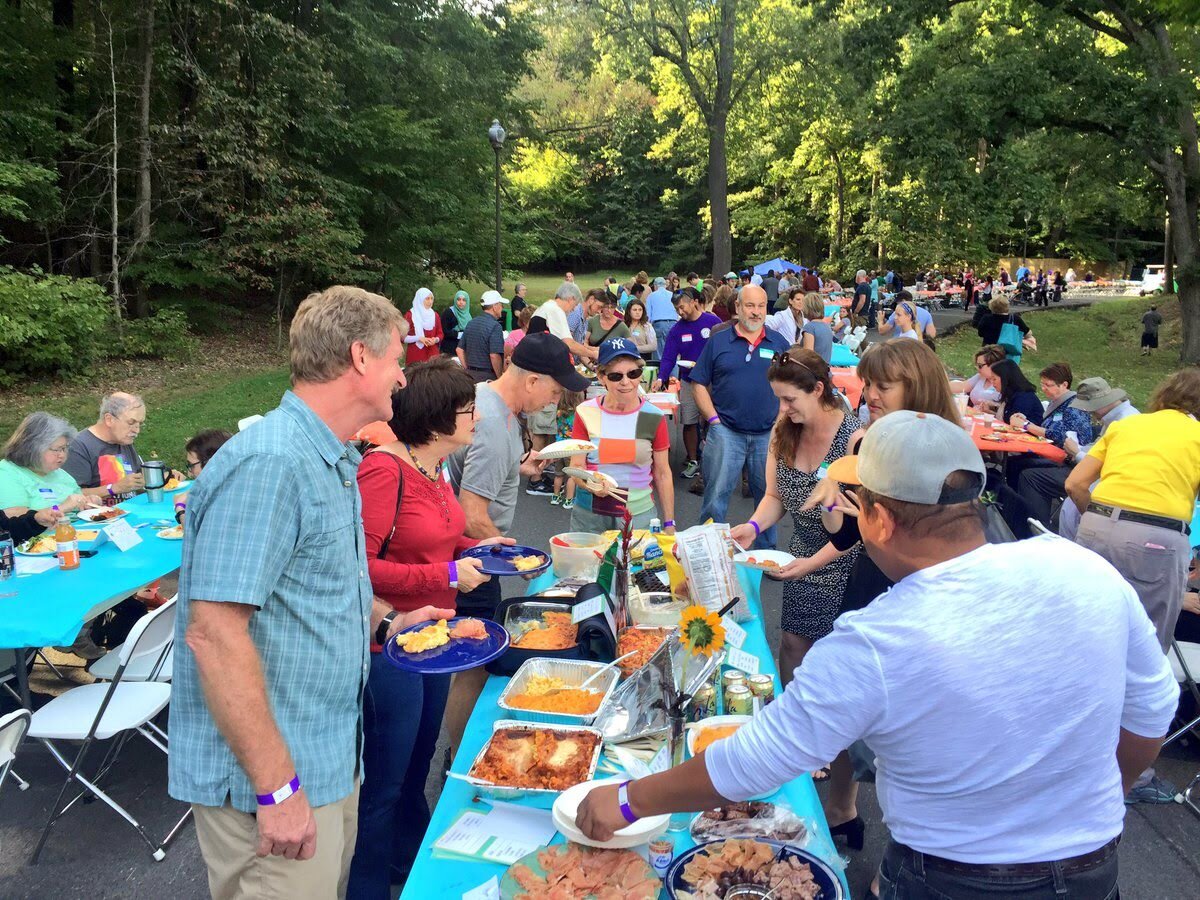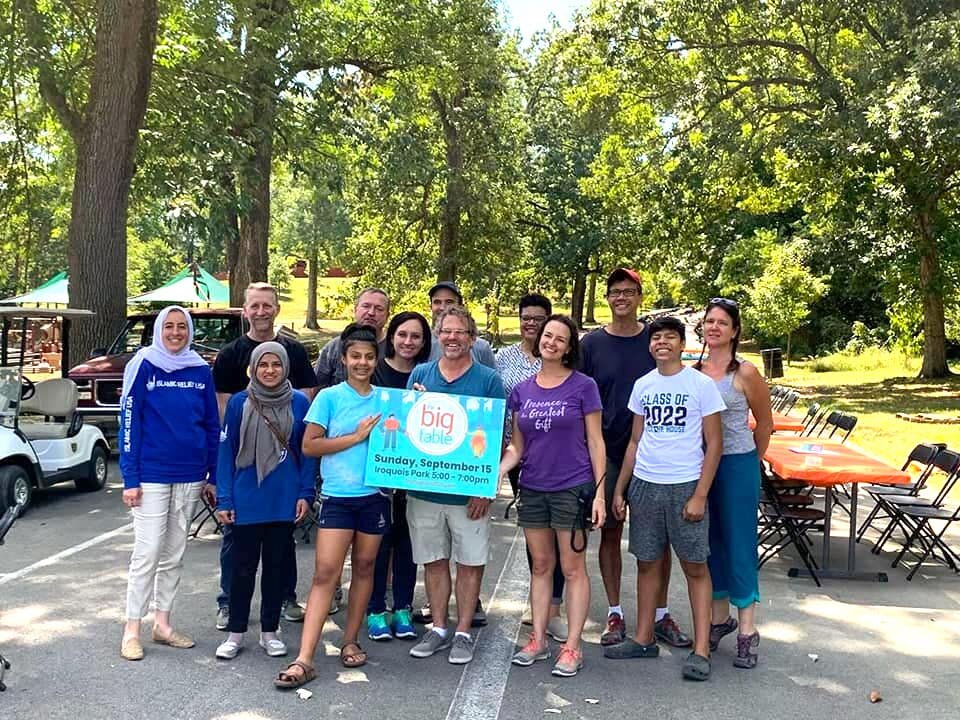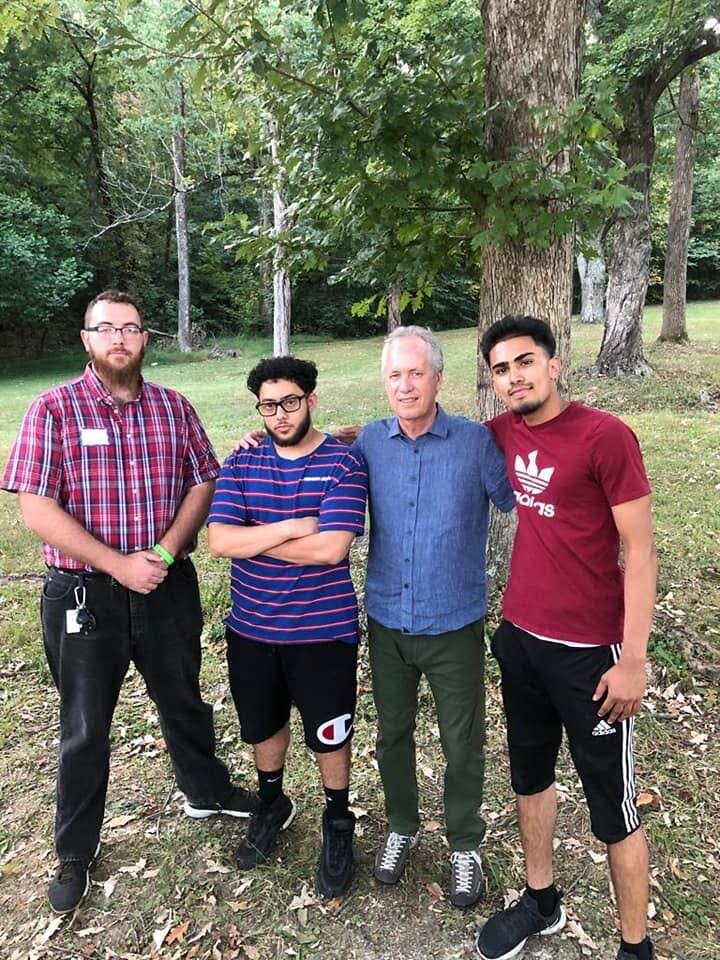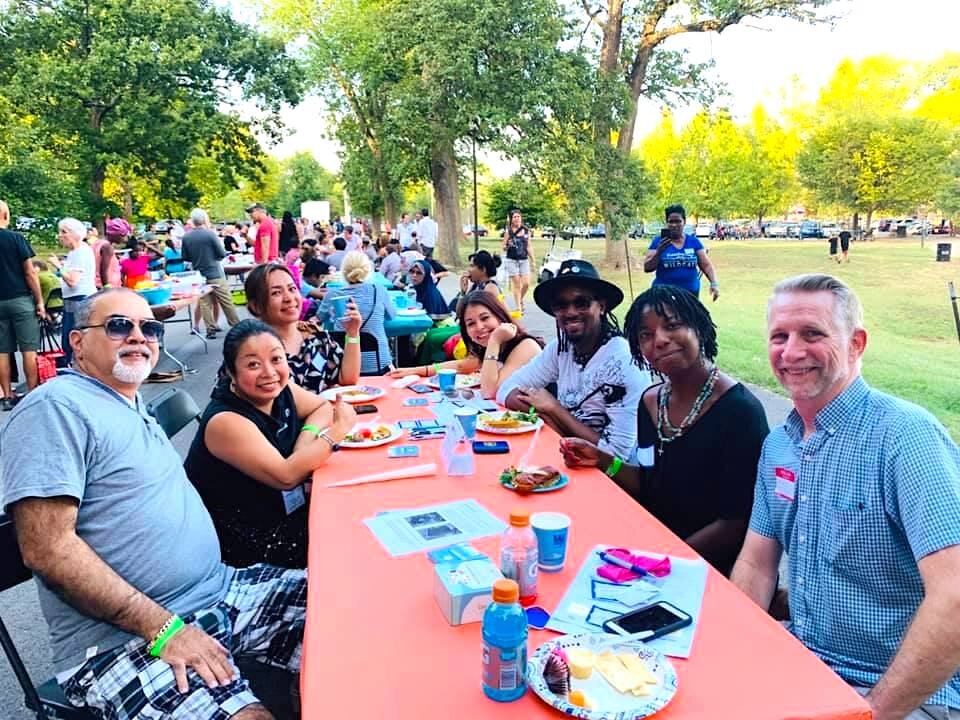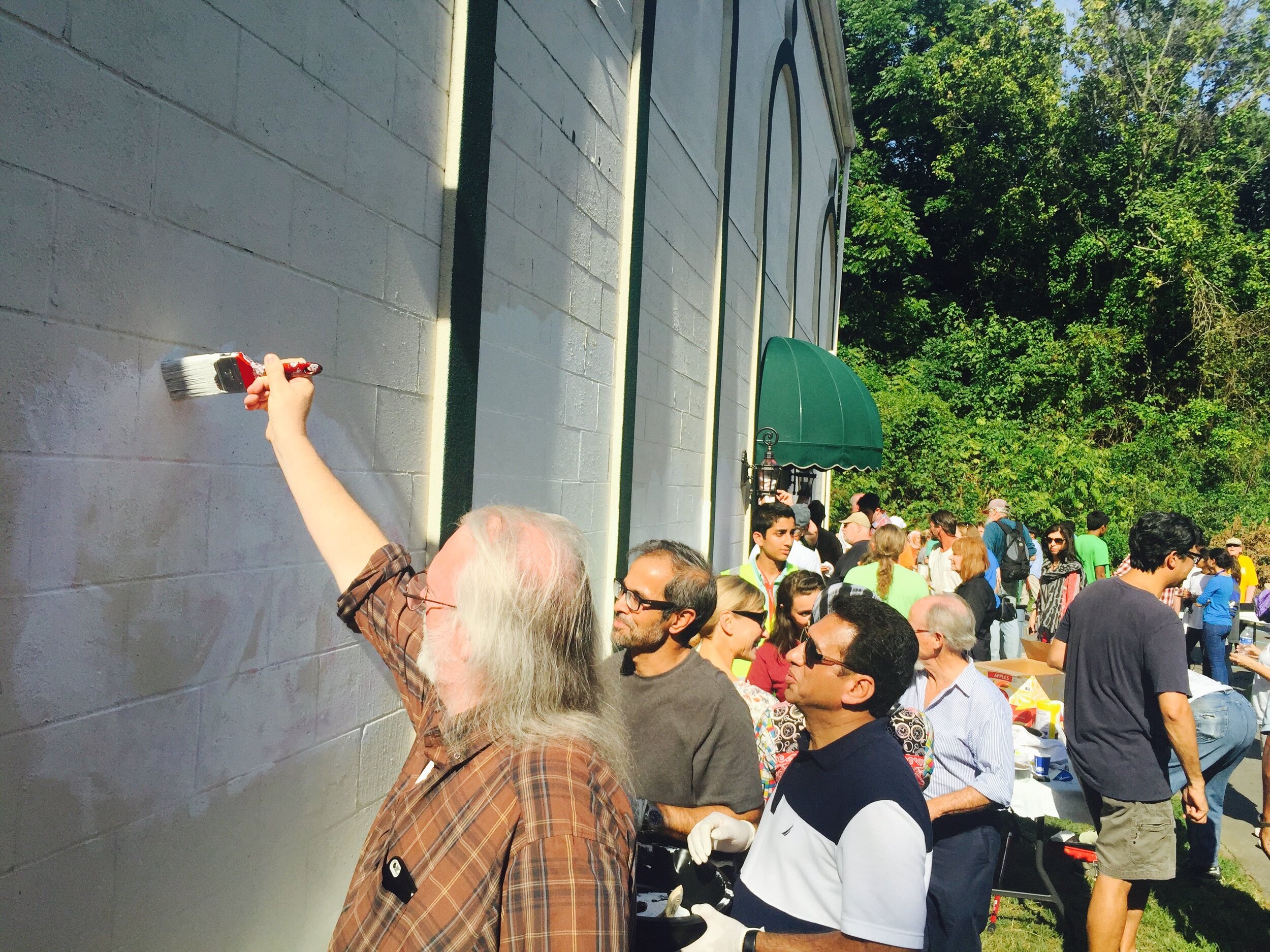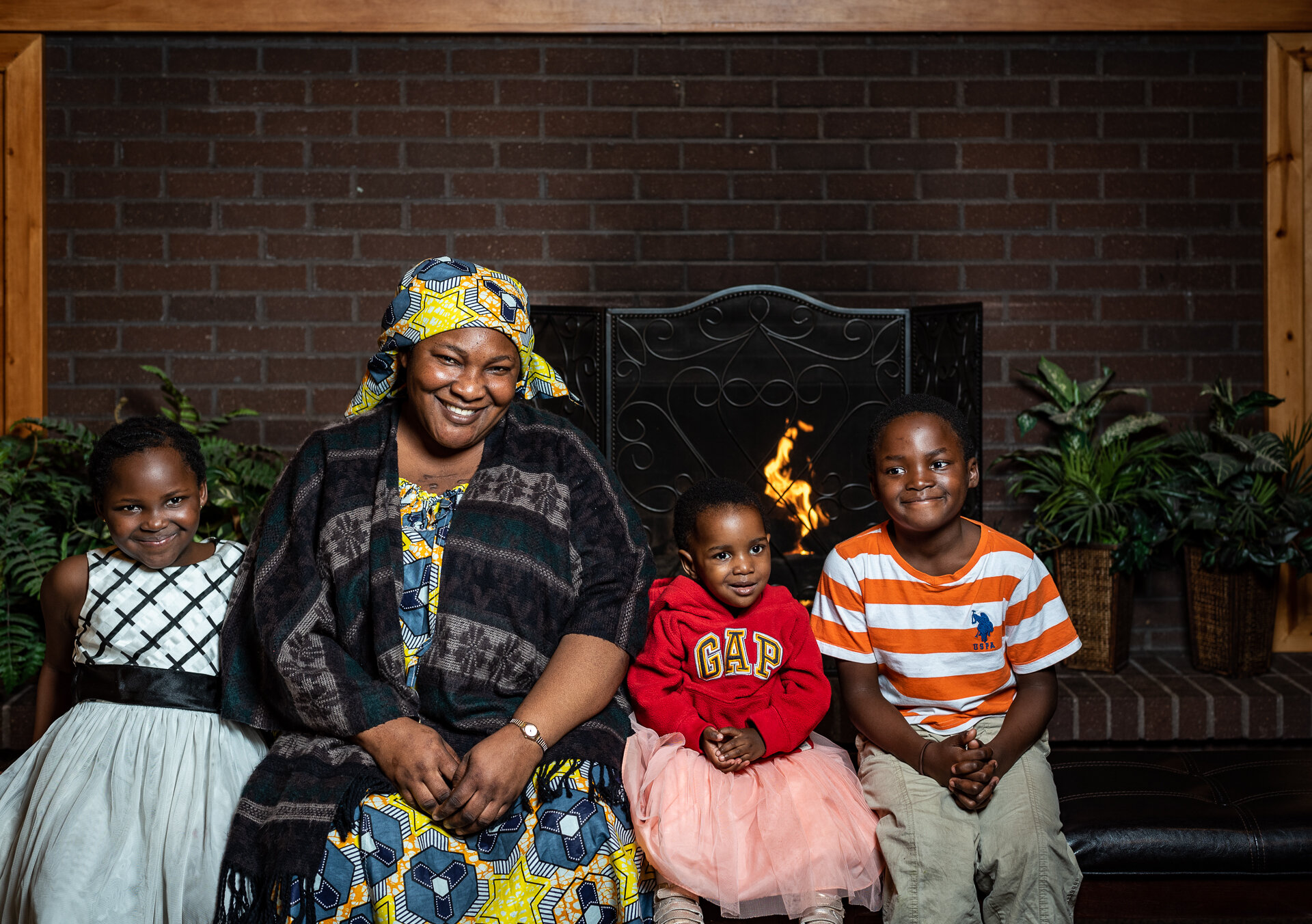Ripple Effects: How Peacebuilding is Spreading in Louisville
by Martin Brooks
Have you ever dropped a pebble in a calm pool of water and watched the ripples roll outward until the entire pool of water seemed to be pulsating with activity? That’s a good way to describe the catalytic work of Peace Catalyst International. People sometimes notice the ripples of peacemaking washing into their lives and spheres of influence, but often they are unaware of the small pebble that started the waves.
Seventeen people came to our first Peace Feast in Louisville on March 4, 2012. We had four international guests from Uzbekistan, Palestine and Yemen. The rest were church friends and family from Kentucky. I wanted my friends to have the opportunity to meet people from other cultures and to hear their stories, so I made a cold call to Mirage Mediterranean Restaurant where I met the owner, Sami. On the wall hung a Muslim prayer rug and a painting of Mary holding baby Jesus. I learned Sami was Palestinian and had owned a restaurant in Jerusalem. I explained that I worked with Peace Catalyst and wanted to bring some of my friends to his restaurant for a meal and to learn about Palestine. If they had a good experience, perhaps they would return and bring their friends to his restaurant.
I asked Sami if he would be willing to share with the group about his time in Israel. He did not want to talk, but consented to answer some questions. He told of running a restaurant prep business in Jerusalem. “I would cut up lettuce, cucumbers, tomatoes early in the morning and deliver them to all of the small kiosks and restaurants. Then some crazy person would blow something up and the whole city would be locked down. My product would spoil because I could not deliver it.” Again and again this happened until he went out of business. So he moved to Louisville, and we’re blessed to have him!
I’ve written elsewhere about why we do Peace Feasts, but the main reason is that these encounters and stories change us. Relationships form, and trust is built. I’ve now worked with Sami many times through the years, and we’ve built what Louisville’s mayor calls “social muscle.” I don’t think Sami fully trusted me as an evangelical Christian walking into his restaurant on that first day, but now we’re friends and he’s a trusted advisor to me.
These encounters and stories change us.
Relationships form, and trust is built.
Our first meeting was a small drop in the pond, rippling out to 45 people attending our next peace feast at his restaurant. The next year, we did a Kurdish Peace Feast with Sami and filled his restaurant, and later the same year the State Department brought eight Pakistani journalists to another Peace Feast. 80 people attended that event, about half of whom were Muslim and the other half Christian. One of the Pakistani journalists visibly bristled when she was introduced to a young man at her table that had served in the US military. By the end of the evening they were friends and posing for pictures together. A drop of water had hit the surface and was making its way into the hearts of these new friends. The city was beginning to notice our peacemaking efforts between Christians and Muslims.
Then, in 2015, the local River Road Mosque was vandalized. Louisville’s mayor, the police chief, other politicians, faith leaders, and the press showed up to call the city to a better story. One Pakistani leader turned to me that morning and said, “Martin, you probably know our community as well as any non-Muslim in Louisville. Would you say a few words to the press?” I had spent a lot of time building relations with this Muslim community. I had brought many Christians to the mosque to visit, and the imam had helped me make videos to answer questions my Christian friends were asking about Islam. It was my great honor to brag about how this community had quietly bought lunch for 300 of the city’s firefighters and police officers to honor their service at the mayor’s 9/11 memorial. When a tornado had destroyed a nearby community, this group of Muslims had been among the first to volunteer by helping clean up the mess and raising $20,000 to buy school supplies for the area’s children.
The day after that press conference, nearly 1000 people showed up to paint over the derogatory graffiti on the mosque. There were so many volunteers that there wasn’t enough graffiti for everyone to have something to paint! Here is a video the city put out about the mosque cleanup. One of the Pakistani leaders in the mosque also used that event to write an op-ed that appeared in The Express Tribune, an English paper in Pakistan. In that op-ed, entitled Would We Have Done Any Better, he said that when his Muslim minority community was attacked in Louisville, the city rallied to their defense to protect them. He then challenged his own religious community and the government of Pakistan to protect religious minorities there. Now the ripple effects of that first connection in Louisville were being felt around the world.
Before the vandalism happened, we had already arranged to present the mosque with a Compassion Bench to highlight how this Muslim community had served the city. Ironically, that bench was to be presented the same week the vandalism took place. So as hundreds of people painted over the graffiti, others sat with their Muslim, Christian, and Jewish neighbors to have their photos taken on the Compassion Bench.
In November 2016 we had our second Somali Peace Feast at a restaurant owned by an entrepreneurial Somali immigrant. The event happened the night before the 2016 Presidential election. The results of the election were a surprise, and my Muslim friends were afraid. News stories of banning Muslim immigrants, or even deporting Muslims, filled the airwaves. Two days after the election, friends of the Muslim community met at a local mosque I had done another Syrian Peace Feast at. That night, the mayor was there with the police chief, the public school superintendent, and a Federal District Attorney. Each took their turn at the mic assuring the hundreds of Muslims gathered that they were safe in Louisville. We would protect them, both as our friends and as US citizens.
Within weeks, we participated with other individuals and organizations we had met through Peace Feasts to create a video, We Are Louisville, reassuring the foreign born that they are welcome in Louisville. It would take several months to organize, but an event called the Big Table would soon result from these converging relationships.
The first Big Table was a collaborative effort to connect marginalized communities with the rest of our city. The goal was to pull off one of the largest potlucks in the world! The mayor’s office and local media got behind it to secure a location and promote the event. Nonprofits and refugee organizations, businesses, mosques, synagogues, churches, public and private schools and universities committed people, time and money. There was no center stage for politicians or bands, but there were decks of cards on each table with discussion questions like we had done at Peace Feasts. We didn’t want it to be a political rally but a place where people showed support for marginalized communities and got to know each other a little better. A host at each of the 200 tables welcomed people and helped them feel connected. “Bring a dish for six,” was the pitch, and we were thrilled when roughly 1000 Louisville neighbors showed up!
The Big Table has now become an yearly event, and this September 1800 people came to our third annual Big Table.
That first small Peace Feast of 17 people in 2012 had catalyzed into a gathering of 1800 people in 2019.
A survey done at the event revealed that 81% of the people met someone from a different culture and 97% would recommend the event to others. It has now become a major event with volunteers from many organizations. I like to think that the first small Peace Feast of 17 people in 2012 had catalyzed into a gathering of 1800 people in 2019. Certainly Peace Catalyst did not do it on our own, but that is not the point. The point is to inspire others to do great things, things that change our culture. Things that bring the love of God to our part of the world. A drop in the water had ripple effects that were reaching across Louisville and beyond. Other cities are now contacting us to explore Big Tables in their cities. In 2019, Islamic Relief USA helped fund the event and sent people from DC to participate. Afterward, they shared a short video about the Big Table at the Islamic Relief 25th Anniversary Gala. I was able to speak at that event and discussed bringing a similar event to DC.
Though many people worked together to make the event happen, the real heroes of the story were the people who showed up. They showed up to the Peace Feasts. They showed up when the mosque was vandalized. They brought their friends and showed up at the Big Table. Unless the ripples move through the hearts of people, nothing changes. I believe this is the work of God, changing lives. I am delighted to be part of helping people love their neighbors.
As 2020 is now well underway, I want to pause and celebrate the small things. I am reminded how often Jesus used a meal setting to bring people together. We are still talking about who he ate with and some of the things they discussed around those tables. It had ripple effects that have changed our world. He also talked about mustard seeds and yeast - small things with great potential. The kingdom of God always seems to start small, like a single drop of water in a calm pool. The ripple effects may not be immediately obvious, but just wait. That is what it means to be a peace catalyst.
The real heroes of the story are the people who showed up. They showed up to the Peace Feasts. They showed up when the mosque was vandalized. They brought their friends and showed up at the Big Table.
